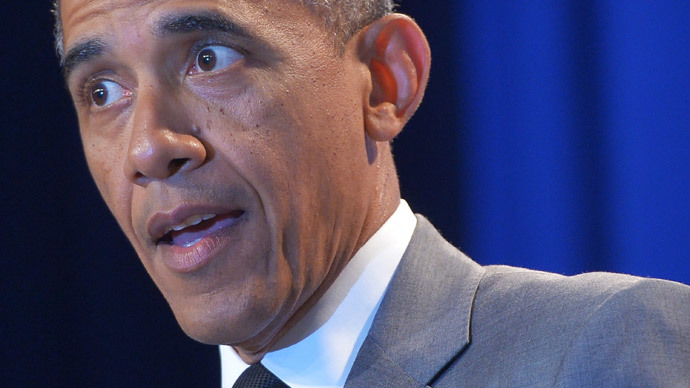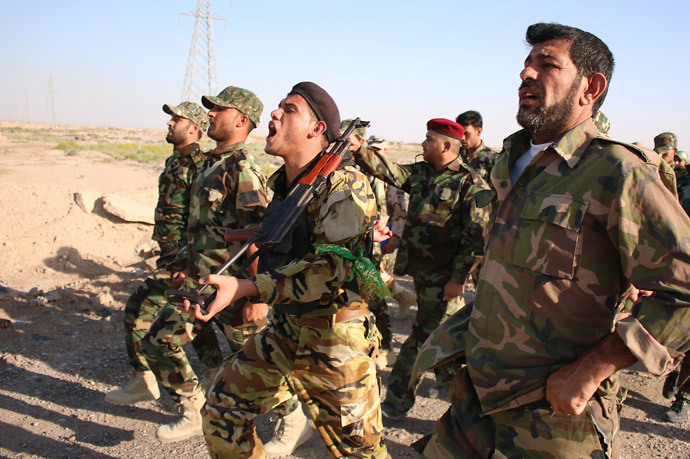‘Is Barack Obama a wimp?’ conservatives ask

Is the US president afraid of deploying the American military to address global security challenges? That is the charge being leveled at him by conservatives dismayed by his 6-year-long shirking from large-scale overseas military action.
In light of Obama’s latest decision to minimize a direct American military role to combat the surging Islamic State in Iraq and the Levant (ISIL), former US Vice President Dick Cheney has lashed out at the president’s foreign policy of “weakness and retreat” which has “reduced our ability to influence events around the world.”
Another Republican Party hawk, Dov Zakheim, paints Obama as a sorry character in American history whose “presidential passivity” is slashing the American defense budget and inflicting “irreversible harm to America's international standing.”
Dissatisfaction with Obama’s default preference to keep the military option off the table is also drawing brickbats from his own camp of pro-Democratic Party liberals. Roger Cohen of The New York Times alleges that Obama has converted America from a ‘can-do nation’ into a ‘can-avoid nation’ that is conspicuously lacking in resolve to stabilize theatres of violence like Ukraine, Syria, Iraq and Egypt.
Cohen’s fellow columnist Maureen Dowd has damned Obama as a president who dithers, flip-flops on self-announced ‘red lines’ (as in his warning that chemical weapons usage in Syria would not be tolerated), and is “mindfully uncertain” about adopting hard force to back up his diplomacy.
The chorus of criticism has spread to Obama’s own top aides who served uneasily under him. His first Secretary of State, Hillary Clinton, writes in a new memoir, Hard Choices, that Obama ignored her advice not to “flatter (Russian President Vladimir) Putin” and overruled her on a policy of arming Syrian rebels fighting to upstage President Bashar al-Assad.
Her frustration with Obama’s consistent reluctance to flex American military muscle is matched by his first Defense Secretary, Robert Gates, whose post-retirement book, Duty, claims that the president never trusted his military to win the war in Afghanistan and was skeptical about the value of the US troop surge there in 2009.
Obama’s willingness to stick to a non-military path has angered conservative American allies like Saudi Arabia and Israel too. These countries want America to come out blazing with all guns against their regional rivals even if this militates against US national interests. Obama’s ‘No thank you’ message to serving such ulterior agendas has irritated Riyadh and Tel Aviv.
Advisers of Japanese Prime Minister Shinzo Abe have also expressed murmurs of discontent at Obama by casting doubts at the US president’s firmness in rolling back Chinese military pushiness in the Asia Pacific.
Feeling the pulse
Unlike previous American leaders, Obama does not follow the maxim of ‘my friend’s enemy is my enemy’ and automatically apply military pressure on that nation. Instead of clearly demarcating a country as a foe or a friend as seen through the prism of a US ally, he applies a degree of dispassionate analysis and assessment about each country on its own merits and relies more on diplomacy to manage disputes rather than throwing around America’s armed might.
Obama has retorted to all the flak about being a softie and a “wuss” (former US President Bill Clinton’s judgment of Obama on Syria) with a catchy aphorism: “just because we have the best hammer (i.e. powerful military) does not mean that every problem is a nail.” To his credit, he has used force judiciously and more surgically than the sledgehammer policies of his gung-ho predecessor, George W Bush.

Obama is essentially a practitioner of brainpower over brawn. Opponents of his supposed weak-kneed foreign policies forget that Osama bin Laden was assassinated through a Navy Seals operation ordered by this president. Likewise, the recent capture of Abu Khattala, a Libyan jihadist suspected to be involved in the killing of the US Ambassador Christopher Stevens, by US special operations forces near the Mediterranean coast was a daring use of force by the president in a calculated and limited mission with a clear end goal.
Earlier this year, Obama similarly ordered American commandos to ambush and capture Abu Anas al-Libi, another Libyan jihadist suspected to be the key organizer of terrorist attacks on US embassies in East Africa, in a lightning operation in Tripoli. Acerbic caricatures of Obama as a peacenik and a dove miss the fact that he is the president who maximized American unmanned aerial drone attacks in Yemen, Pakistan, Afghanistan and Somalia, which scalped high profile terrorists but also caused hundreds of civilian casualties.
Obama has also significantly advanced America’s cyber warfare and cyber surveillance projects, activating major computer hacking attacks and espionage on partners and antagonists that earned the wrath of many on both the Left and the Right of the political spectrum. Notwithstanding his instinctive distaste for conventional war, Obama has beefed up America’s unconventional weaponry and integrated it into his national security strategy.
He has also frequently resorted to economic sanctions as alternatives to kinetic military action. The US Under Secretary for Terrorism and Financial Intelligence, David Cohen, has commented that economic warfare is an “increasingly important tool” in Obama’s foreign policy. The label of wimp hardly sticks to such a president.
The levers of force that Obama has unleashed are calibrated and tailored to preserve American lives and reduce the burden on American resources. His vision of being remembered as the man who ended a tendency of American leaders since the end of the Cold War to plunge into counterproductive ‘humanitarian interventions’ or Pyrrhic land wars is in tune with the mood of a war-weary US public and the overall economic decline that America is stuck in.
In contemporary American politics, none can beat Obama’s skill of feeling the pulse of citizens and responding to it. Castigators of his so-called effete foreign policy and unmanly downsizing of the Pentagon’s budgets are on the wrong side of history who do not realize the folly of exorbitant and militaristic foreign policies.

Rare sanity
The Obama administration’s pitch is that America is doing a lot globally through non-military means and that isolationism or withdrawal from international commitments is not its intention. The investment Obama has made in diplomatic and political solutions to crises such as Ukraine, the Israel-Palestine dispute, the Iran nuclear imbroglio and the East Asia naval tensions may or may not yield desired breakthroughs. But they are instances where he tried to present himself as a statesman.
As an African American, a Nobel Peace Prize winner and a former community organizer, Obama was expected by his progressive followers to press for far-ranging limits on the US military industrial complex and on NATO’s aggressive eastward expansion. These hopes remain unfulfilled because every American president inherits certain entrenched structures against which he cannot revolt.
If the Left wing’s grudge with Obama is based on unfulfilled aspirations, the Right wing’s cheap shots at Obama for “taking a nap” (Republican House Speaker John Boehner on the president’s Iraq policy), sitting on his haunches, and permitting American supremacy of the world to slip away are driven by misguided belief that the US has unlimited capability to be the sole arbiter of the international system.
History will judge Obama’s aversion for militarism as sanity at a time when America is no longer number one in every sphere. A trigger-happy president during a period of America’s relative decline and adjustment to economic crisis would have been a disaster. Imagine how violent the world would have been if a cowboy like John McCain won the US presidential election in 2008 or if Cold Warrior Mitt Romney was victorious in 2012.
Within the narrow range of choices presented by the American democratic system, Obama was by far the constructive option. Average American voters chose him twice and have proven themselves smarter than his warmongering critics.
The statements, views and opinions expressed in this column are solely those of the author and do not necessarily represent those of RT.
The statements, views and opinions expressed in this column are solely those of the author and do not necessarily represent those of RT.













